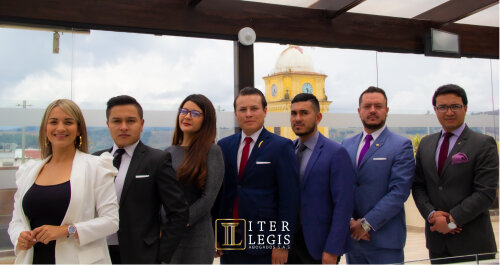Best Disability Lawyers in Tunja
Share your needs with us, get contacted by law firms.
Free. Takes 2 min.
List of the best lawyers in Tunja, Colombia
About Disability Law in Tunja, Colombia
Disability law in Tunja, Colombia, is shaped by both national and local regulations that protect the rights and dignity of individuals with disabilities. The Colombian Constitution, Law 1618 of 2013, and Law 1346 of 2009 establish a framework that guarantees equality, non-discrimination, and the full participation of disabled individuals in all aspects of society. Locally, the city of Tunja works through public programs and local ordinances to further these protections, ensuring accessible public spaces, inclusive education, and equitable employment opportunities for people with disabilities.
Why You May Need a Lawyer
While many protections exist for persons with disabilities, there are situations when legal assistance becomes essential. Common situations where legal help is needed include:
- Facing discrimination at work, in education, or in access to public services due to a disability.
- Problems accessing health care, social services, or government benefits specifically designated for individuals with disabilities.
- Ensuring reasonable accommodations in schools, workplaces, or public spaces are provided as mandated by law.
- Securing rights to financial aid, disability pensions, or social security benefits.
- Complexities in navigating legal processes for disability certification and recognition.
- Filing complaints or lawsuits related to inaccessibility or discrimination experienced.
- Handling family or guardianship matters involving a person with a disability.
A lawyer experienced in disability law can guide you through these challenges, protect your rights, and help obtain fair treatment and access to programs and services.
Local Laws Overview
In Tunja, several key laws and regulations must be noted:
- Law 1618 of 2013: Establishes the rights of persons with disabilities in Colombia, including access to education, health care, employment, and social inclusion.
- Law 1346 of 2009: Approves the Convention on the Rights of Persons with Disabilities, integrating international norms into Colombian law.
- Law 1145 of 2007: Creates the National Disability System and outlines responsibilities for municipal governments.
- Municipal Regulations: Tunja's local government develops and applies specific ordinances to improve accessibility, mobility, and social participation for persons with disabilities, including adaptations of public infrastructure and support programs.
These laws require public and private entities to offer reasonable accommodations, prohibit discrimination, and promote the social, economic, and political participation of people with disabilities.
Frequently Asked Questions
What constitutes a disability under Colombian law?
A disability is any long-term physical, mental, intellectual, or sensory impairment which, in interaction with barriers, may hinder full and effective participation in society on an equal basis with others.
How is disability certified in Tunja?
Disability is certified through a medical evaluation by the Health Promoting Entity (EPS) or Municipal Health Office. The certification allows access to specific benefits, support, and social programs.
Can I request workplace accommodations?
Yes, Colombian law requires employers to provide reasonable accommodations for employees with disabilities, unless it imposes undue hardship. Common accommodations include adjusted workstations or flexible schedules.
What should I do if my rights are violated?
You can file a complaint with the Defensoría del Pueblo, the Personería Municipal, or take the issue to the courts. Having legal assistance is highly recommended to navigate these processes.
Are there education rights for children with disabilities?
Yes, children with disabilities have the right to inclusive education. Schools must provide reasonable accommodations and cannot deny admission based on disability.
How can I access governmental disability benefits?
Once certified as a person with a disability, you may apply for programs such as economic support, transportation aid, and social inclusion services at your local government office or through the Secretaría de Desarrollo Social.
Can public spaces deny access to people with disabilities?
No, public spaces must be accessible, and denying access is a form of discrimination prohibited by law. You can report inaccessible spaces to local authorities or pursue legal action.
Are there penalties for disability discrimination in Tunja?
Yes, institutions or individuals found discriminating against disabled persons can face administrative, civil, or even criminal penalties depending on the severity of the act.
Who is responsible for ensuring accessibility in Tunja?
Responsibility is shared between public authorities, private service providers, and property owners. They must comply with accessibility standards established by law and local ordinances.
Is free legal advice available for disability-related cases?
Some government offices, such as the Personería Municipal and local defensorías, offer free legal guidance. Certain NGOs may also provide free or low-cost legal services.
Additional Resources
Individuals in Tunja seeking assistance or information related to disability rights can contact the following entities:
- Secretaría de Desarrollo Social de Tunja: Local office providing support and coordination of disability programs.
- Personería de Tunja: Offers advice and can process complaints about rights violations.
- Defensoría del Pueblo: National entity that protects human rights, including those of disabled persons.
- Instituto Nacional para Ciegos (INCI) e Instituto Nacional para Sordos (INSOR): For individuals with visual or hearing disabilities, these institutes offer tailored support.
- Non-governmental organizations: Local NGOs often provide counseling, referrals, and legal support for people with disabilities and their families.
Next Steps
If you or a loved one are experiencing issues related to disability in Tunja, Colombia, consider the following steps:
- Gather all relevant documents, such as medical records, certification of disability, and evidence of the problem or rights violation.
- Contact your local Secretaría de Desarrollo Social or the Personería Municipal to receive guidance on available programs and your legal options.
- If you wish to initiate a formal complaint or legal action, consult with a lawyer who has experience in disability law.
- Use free legal aid if cost is a concern, or seek assistance from trusted NGOs and advocacy organizations.
- Stay informed about your rights and the support mechanisms in place to protect and empower people with disabilities in Tunja.
Remember, seeking legal advice early can help protect your rights and ensure you have access to the programs and protections you deserve.
Lawzana helps you find the best lawyers and law firms in Tunja through a curated and pre-screened list of qualified legal professionals. Our platform offers rankings and detailed profiles of attorneys and law firms, allowing you to compare based on practice areas, including Disability, experience, and client feedback.
Each profile includes a description of the firm's areas of practice, client reviews, team members and partners, year of establishment, spoken languages, office locations, contact information, social media presence, and any published articles or resources. Most firms on our platform speak English and are experienced in both local and international legal matters.
Get a quote from top-rated law firms in Tunja, Colombia — quickly, securely, and without unnecessary hassle.
Disclaimer:
The information provided on this page is for general informational purposes only and does not constitute legal advice. While we strive to ensure the accuracy and relevance of the content, legal information may change over time, and interpretations of the law can vary. You should always consult with a qualified legal professional for advice specific to your situation.
We disclaim all liability for actions taken or not taken based on the content of this page. If you believe any information is incorrect or outdated, please contact us, and we will review and update it where appropriate.









